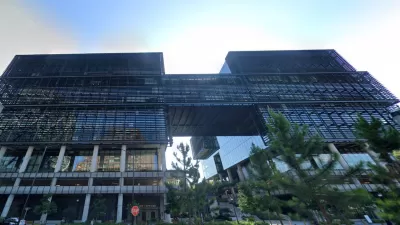In a paradox of green building practices, a new office building can't earn points for building bike facilities unless the storage room has showers and changing rooms, making the price pricier.
"In new office buildings, the U.S. Green Building Council, which certifies buildings as LEED-compliant, awards points only for bike rooms with showers and changing rooms. And in existing buildings, bike rooms also do not automatically earn LEED points because they are based on behavioral changes in tenants - for instance, if a tenant allows employees to telecommute or if a landlord puts in a bike room that gets heavy use."
This article looks at bike storage facilities of various sizes in office buildings throughout Manhattan, including "perhaps the most ballyhooed, the Empire State Building." The 780 sq. ft room was provided as part of a "$550 million renovation of the Empire State Building to make it environmentally friendly." However, the landlord could have provided the same room as a retail outlet at an annual charge of $500 a square foot. And that doesn't account for the additional costs such as the bike racks which can cost thousands of dollars each depending on how many bikes they store.
"You have a lot of buildings here which would like to get LEED points," said Eric Gural, an executive managing director of Newmark Knight Frank who oversees the 1,000-square-foot bike room at 520 Eighth Avenue. "If we didn't have to put a shower in, I think you'd see a lot more bike rooms that would be provided by landlords." (The bike room at 520 Eighth, like all others in this article, lacks a shower.)
Bike storage rooms have become quite popular due to a 2009 law that requires office buildings "with freight elevators to provide bike storage if a tenant asks". Yet the law does not require a separate storage facility, e.g the cyclist could bring it to his/her office, but some landlords find it makes more sense to provide a storage room. The most popular room may be in "the Starrett-Lehigh Building on West 26th Street, where an 1,800-square-foot space holds about 150 bicycles each day."
FULL STORY: A Room of Their Own for 2-Wheeled Commuters

Planetizen Federal Action Tracker
A weekly monitor of how Trump’s orders and actions are impacting planners and planning in America.

San Francisco's School District Spent $105M To Build Affordable Housing for Teachers — And That's Just the Beginning
SFUSD joins a growing list of school districts using their land holdings to address housing affordability challenges faced by their own employees.

The Tiny, Adorable $7,000 Car Turning Japan Onto EVs
The single seat Mibot charges from a regular plug as quickly as an iPad, and is about half the price of an average EV.

Seattle's Plan for Adopting Driverless Cars
Equity, safety, accessibility and affordability are front of mind as the city prepares for robotaxis and other autonomous vehicles.

As Trump Phases Out FEMA, Is It Time to Flee the Floodplains?
With less federal funding available for disaster relief efforts, the need to relocate at-risk communities is more urgent than ever.

With Protected Lanes, 460% More People Commute by Bike
For those needing more ammo, more data proving what we already knew is here.
Urban Design for Planners 1: Software Tools
This six-course series explores essential urban design concepts using open source software and equips planners with the tools they need to participate fully in the urban design process.
Planning for Universal Design
Learn the tools for implementing Universal Design in planning regulations.
Smith Gee Studio
City of Charlotte
City of Camden Redevelopment Agency
City of Astoria
Transportation Research & Education Center (TREC) at Portland State University
US High Speed Rail Association
City of Camden Redevelopment Agency
Municipality of Princeton (NJ)



























